Ever wondered what makes on-page SEO and off-page SEO different? Knowing the basics of these two SEO types can help your website reach its full potential. We’ll explore on-page and off-page SEO, showing how they affect your online presence and strategies for mastering both. Get ready to boost your marketing skills and take your on page vs off page seo to new levels!
Key Takeaways
- Explore the core differences between on-page and off-page SEO
- Understand the key factors that influence each type of optimization
- Learn how to develop a comprehensive SEO strategy that leverages both on-page and off-page tactics
- Discover the best practices for boosting your website’s visibility and rankings in search engine results
- Gain insights into the importance of balancing on-page and off-page efforts for long-term success
Introduction to On Page vs Off Page SEO
In the world of search engine optimization (SEO), knowing the difference between on-page and off-page strategies is key. Both are important for making your website more visible and ranked higher. It’s vital to understand each one well to create a strong SEO plan.
Table of Contents
What is On-Page SEO?
On-page SEO means making your website better by optimizing things like content and HTML tags. You work on your page titles, meta descriptions, headings, and content. This helps search engines understand and index your site better.
By improving these on-page factors, you make your site more user-friendly. This attracts both search engines and your target audience.
What is Off-Page SEO?
Off-page SEO is about what happens outside your website that affects your online presence. It includes link building and social media engagement. By getting high-quality backlinks and engaging on social media, you show search engines your site is valuable and trustworthy.
Knowing the difference between on-page and off-page on page seo and off page seo is the first step to a solid SEO strategy. This strategy can help you reach your online goals.
“Successful SEO is not about tricking Google. It’s about partnering with Google to provide the best search experience.” – Matt Cutts, former head of Google’s Webspam team
On-Page SEO Factors
Optimizing your website for search engines is key. The on-page SEO factors are crucial. They are the parts of your site you can change to boost your rankings. Learning these factors is vital for making your site more visible and appealing to search engines.
Some important on-page SEO factors include:
- Keyword Optimization – Using the right keywords in your content and meta tags to tell search engines what your page is about.
- Meta Tags – Making your title, description, and other tags clear and enticing to increase clicks from search results.
- Content Quality – Creating valuable, engaging content that meets your audience’s needs and signals relevance to search engines.
- Website Structure – Having a clear, easy-to-use site layout that helps search engines understand your pages’ relationships.
- Page Speed – Making sure your site loads quickly to offer a smooth user experience and meet search engine standards.
By focusing on these on-page SEO factors, you can improve how search engines see and rank your site. This leads to more organic traffic and better online visibility.
| On-Page SEO Factor | Description | Impact on SEO |
|---|---|---|
| Keyword Optimization | Using relevant keywords in your content and meta tags. | Helps search engines understand your page’s topic and relevance, boosting your rankings for those keywords. |
| Meta Tags | Optimizing your title, description, and other tags to clearly describe your page’s content. | Increases clicks from search results and signals relevance to search engines. |
| Content Quality | Creating valuable, engaging content that meets your audience’s needs. | Signals to search engines that your page is relevant, trustworthy, and worth ranking highly. |
| Website Structure | Ensuring a logical, user-friendly site architecture with clear navigation and internal linking. | Helps search engines understand your pages’ relationships and how they should be indexed and ranked. |
| Page Speed | Optimizing your website’s loading speed for a seamless user experience. | Meets search engines’ performance criteria and improves user engagement, positively impacting rankings. |
“Optimizing your on-page SEO factors is like laying a strong foundation for your website’s visibility and success in search engines.”
Off-Page SEO Factors
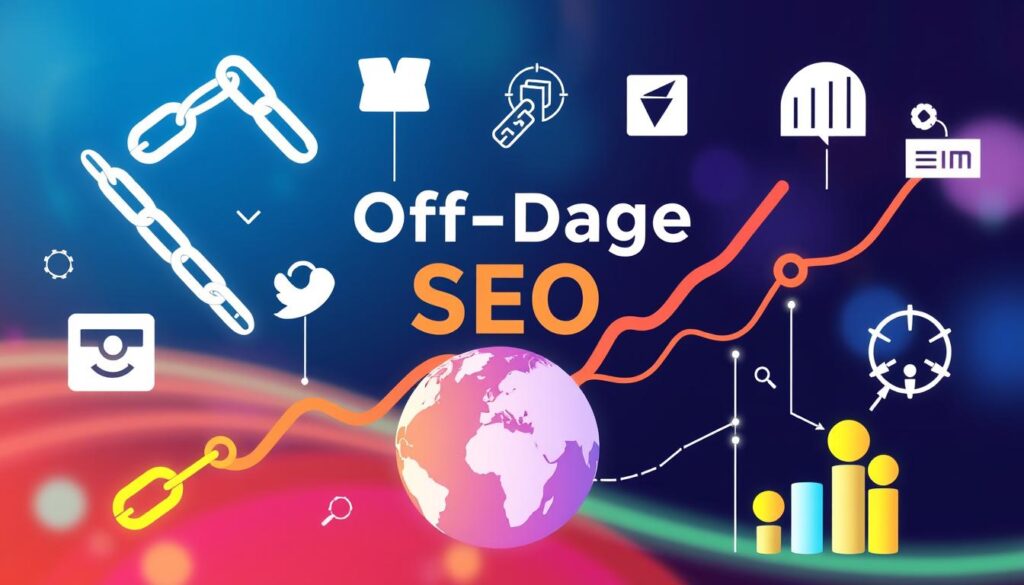
On-page SEO makes your website better. Off-page SEO builds your site’s authority and reputation. It uses external signals. Key strategies include link building and social media engagement.
Link Building Strategies
Link building gets you backlinks from other websites. These links show search engines your site is credible. Use guest posts, find broken links, and reach out to influencers to boost your site’s ranking.
Social Media Engagement
Being active on social media is crucial. Share valuable content and connect with others. This increases your brand’s visibility and tells search engines your site is trustworthy.
“Effective link building and a strong social media presence can significantly impact your overall search engine rankings.”
on page vs off page seo
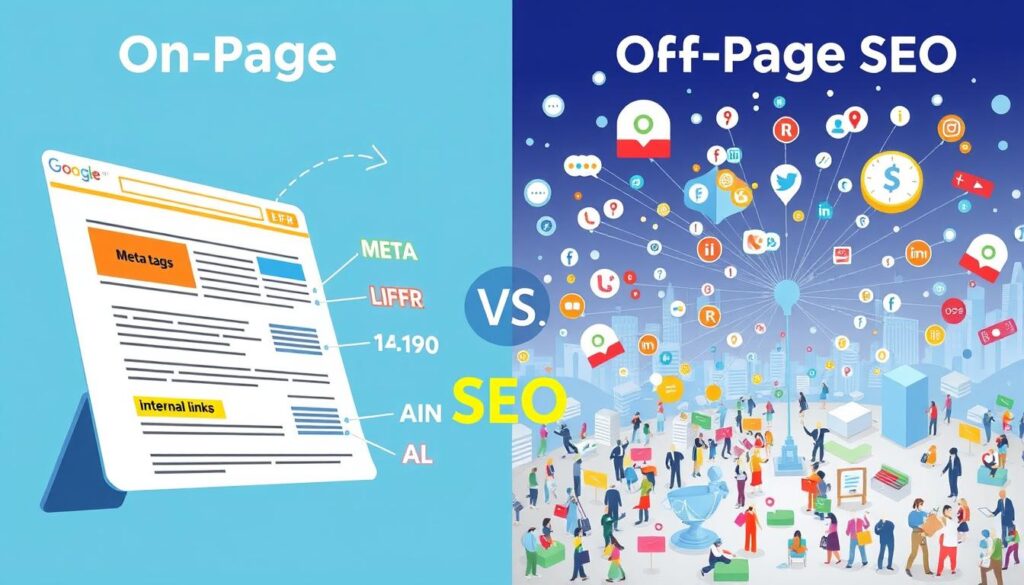
Understanding the difference between on-page and off-page SEO is key. On-page SEO makes your website better by optimizing content and structure. Off-page SEO builds your online reputation through external actions.
On-page SEO includes things like keywords, meta tags, and page speed. These factors help search engines see your site’s value. Off-page SEO, on the other hand, involves link building and social media. It shows your site’s credibility and relevance.
To succeed in SEO, balance on-page and off-page strategies. A solid on-page foundation makes your site technically sound and keyword-rich. A strong off-page strategy boosts your online authority and visibility.
| On-Page SEO | Off-Page SEO |
|---|---|
| Keyword research and optimization Compelling, informative content Optimized URLs, titles, and meta tags Responsive, mobile-friendly design Fast page loading speeds Intuitive site structure and navigation | High-quality backlinks from authoritative sites Active social media presence and engagement Guest posting on industry-relevant blogs Local business listings and citations Positive brand mentions and reviews Influencer and partnership collaborations |
Aligning your on-page and off-page SEO efforts can greatly improve your site’s performance. It’s important to keep improving your strategies. This way, you’ll optimize both internal and external factors for long-term success.
“The perfect marriage of on-page and off-page SEO is the key to unlocking your website’s full potential in search.”
Balancing On Page vs Off Page SEO Efforts
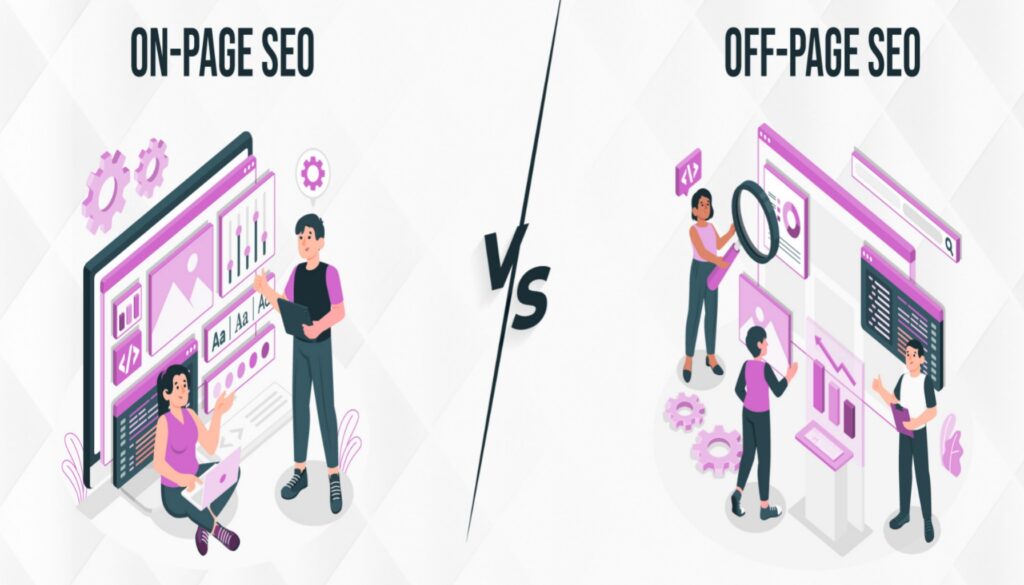
To get the most out of your SEO, it’s key to balance your website’s on-page and off-page work. Focus on optimizing your site’s internal elements and doing effective off-page tasks. This way, your site will be seen more by search engines and rank higher.
Prioritizing SEO Tasks
Creating a plan that covers both on-page and off-page SEO is crucial. First, check your website’s current state and see where it needs work. This might include:
- Improving your site’s content, meta tags, and layout for on-page SEO
- Starting a strong link-building plan to boost off-page signals
- Connecting with your audience on social media to grow your online presence
- Keeping an eye on your site’s performance to find ways to get better
By focusing on these tasks and using your time wisely, you can build a strong SEO plan. This plan will cover both on-page and off-page needs.
| On-Page SEO Tasks | Off-Page SEO Tasks |
|---|---|
| Keyword research and optimization Creating and optimizing content Improving meta tags and title tags Working on your site’s structure and navigation Making your site faster | Building links and reaching out Engaging on social media Managing your online reputation Getting listed in directories Watching your competitors |
By balancing your on-page and off-page SEO, you’ll have a complete strategy. This strategy will improve your site’s search engine rankings and bring in more visitors.
Measuring and Tracking SEO Success
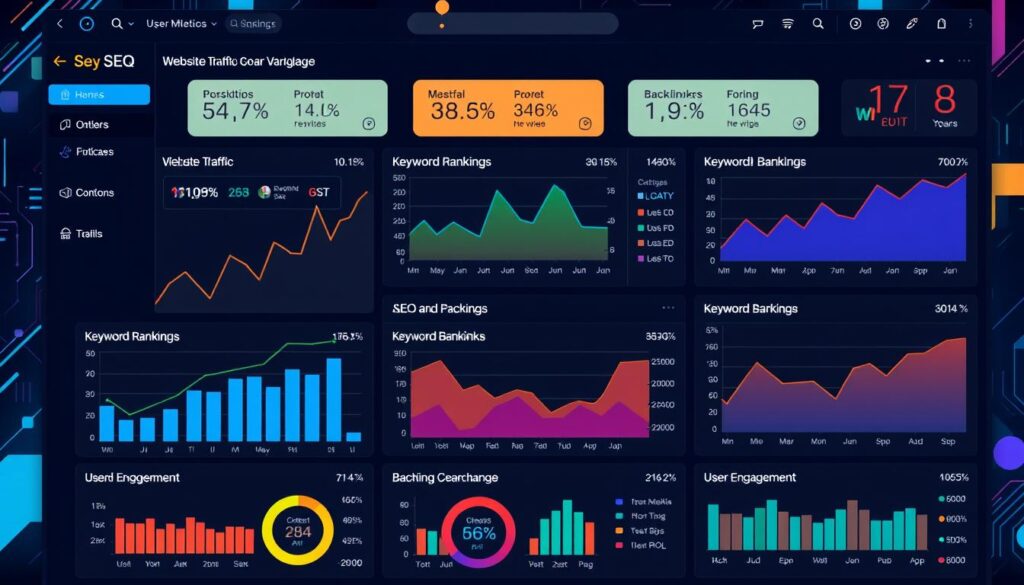
It’s key to measure your SEO success to know what’s working and what’s not. By tracking important KPIs, you can make smart choices to improve your strategy. This helps you reach your goals.
Key Performance Indicators
For measuring seo success, there are several key KPIs to watch:
- Organic Traffic: This shows how many visitors find your site through search engines. Watching your organic traffic can tell you if your seo kpis are working.
- Search Engine Rankings: Checking your site’s rankings for key words can show how well your optimization is doing.
- Conversions: This tracks visitors who take actions like buying or filling out forms. It shows how your SEO affects your business.
- Bounce Rate: This shows how many visitors leave after seeing just one page. A low bounce rate means your content is engaging.
- Time on Site: How long visitors stay on your site shows how valuable your content is.
By watching these KPIs closely, you can see what’s working in your SEO. You can also find areas that need more work.
“Measuring and tracking your SEO success is crucial for making informed decisions and maximizing the impact of your optimization efforts.”
SEO Best Practices

SEO is all about following the best ways to improve your online presence. It’s important to stick to ethical methods to avoid penalties and keep your reputation safe. “Black hat” SEO can harm your site and reputation.
White Hat vs. Black Hat SEO
White hat SEO means using methods that search engines approve of. It includes making your content better, improving your site’s structure, and getting quality backlinks. Black hat SEO, on the other hand, uses tricks like keyword stuffing and link farming to cheat the system.
Black hat SEO might seem to work fast, but it’s risky. It can lead to serious penalties, like being completely removed from search results. White hat SEO takes longer but is safer and helps your site grow over time.
- seo best practices involve optimizing your content, improving site structure, and building high-quality, relevant backlinks.
- white hat seo aligns with search engine guidelines and provides genuine value to users.
- black hat seo involves manipulative and deceptive practices that can result in penalties and damage your online reputation.
By sticking to seo best practices and using white hat SEO, you can build a strong online presence. This attracts quality traffic and helps you succeed in digital marketing for the long haul.
Conclusion: On Page vs Off Page SEO

Understanding the difference between on-page and off-page SEO is crucial. Mastering both can make your website more visible. It attracts the right audience and boosts your business.
Improving your website’s content and structure is on-page SEO. Building quality backlinks and using social media is off-page SEO. A balanced approach is essential. This way, you can outshine your competitors and lead your market.
Remember, on-page and off-page SEO work together. They can take your website to great success. Use this knowledge to grow your business and dominate online.
You may like these :
How Off-Page SEO Impacts Your Google Rankings [Explained]
The Ultimate Guide to On-Page SEO Tools in 2024
Google AdSense Tutorial 2024: Create AdSense Account, Apply & Handle Rejections
Exploring Low-Budget Digital Marketing Strategies for Startups
Frequently Asked Questions: On Page vs Off Page SEO
1. What is the difference between On Page vs Off Page SEO?
On-page SEO means making your website better for search engines. This includes things like content, HTML tags, and how your site is set up. Off-page SEO is about what happens outside your site, like getting links and using social media. Both help your site show up better online.
2. What are the key on-page SEO factors?
Important on-page SEO factors are keywords, meta tags, and content quality. Also, how your site is structured and how fast it loads are key. These elements help search engines understand and rank your site better.
3. What are the key off-page SEO factors?
Off-page SEO is about building your site’s reputation. This includes getting quality backlinks and being active on social media. Good link building and a strong social media presence can really help your site’s rankings.
4. How can I balance my on-page and off-page SEO efforts?
Finding the right balance between on-page and off-page SEO is crucial. Prioritize your tasks and use your resources wisely. This way, your site will be optimized both inside and out, leading to better visibility and rankings.
5. How can I measure the success of my SEO strategy?
It’s important to track how well your SEO is doing. Look at things like organic traffic, rankings, and conversions. This helps you see what’s working and what needs improvement, so you can make your strategy better.
6. What are the best practices for SEO?
To keep your SEO successful, follow best practices and ethical methods. Stick to “white hat” SEO that search engines approve of. Avoid “black hat” tactics that can harm your site’s reputation and rankings.
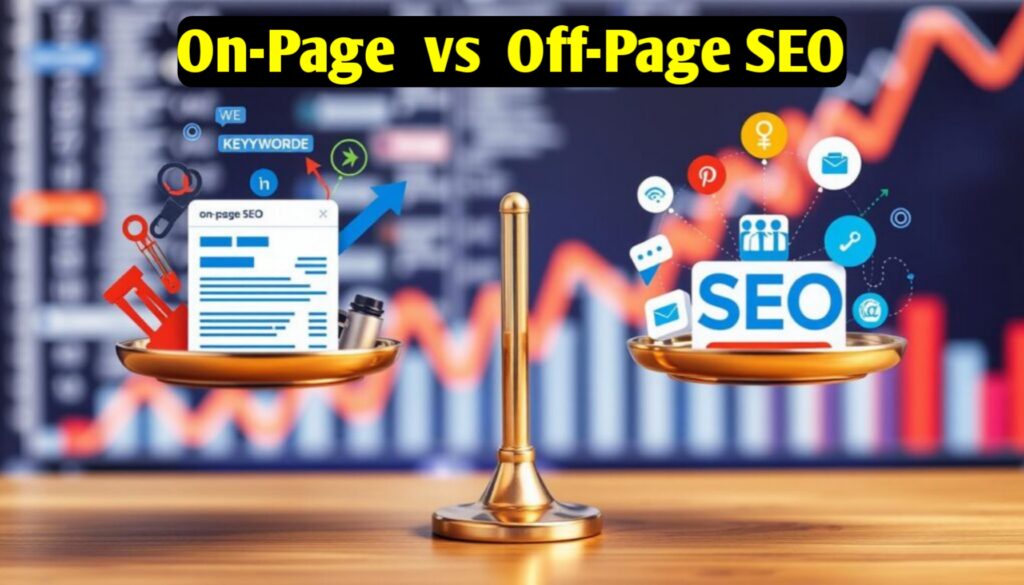



![How Off-Page SEO Impacts Your Google Rankings [Explained] How Off-Page SEO Impacts Your Google Rankings](https://thewebso.com/wp-content/uploads/2024/09/image-7-1024x585-1.jpeg)